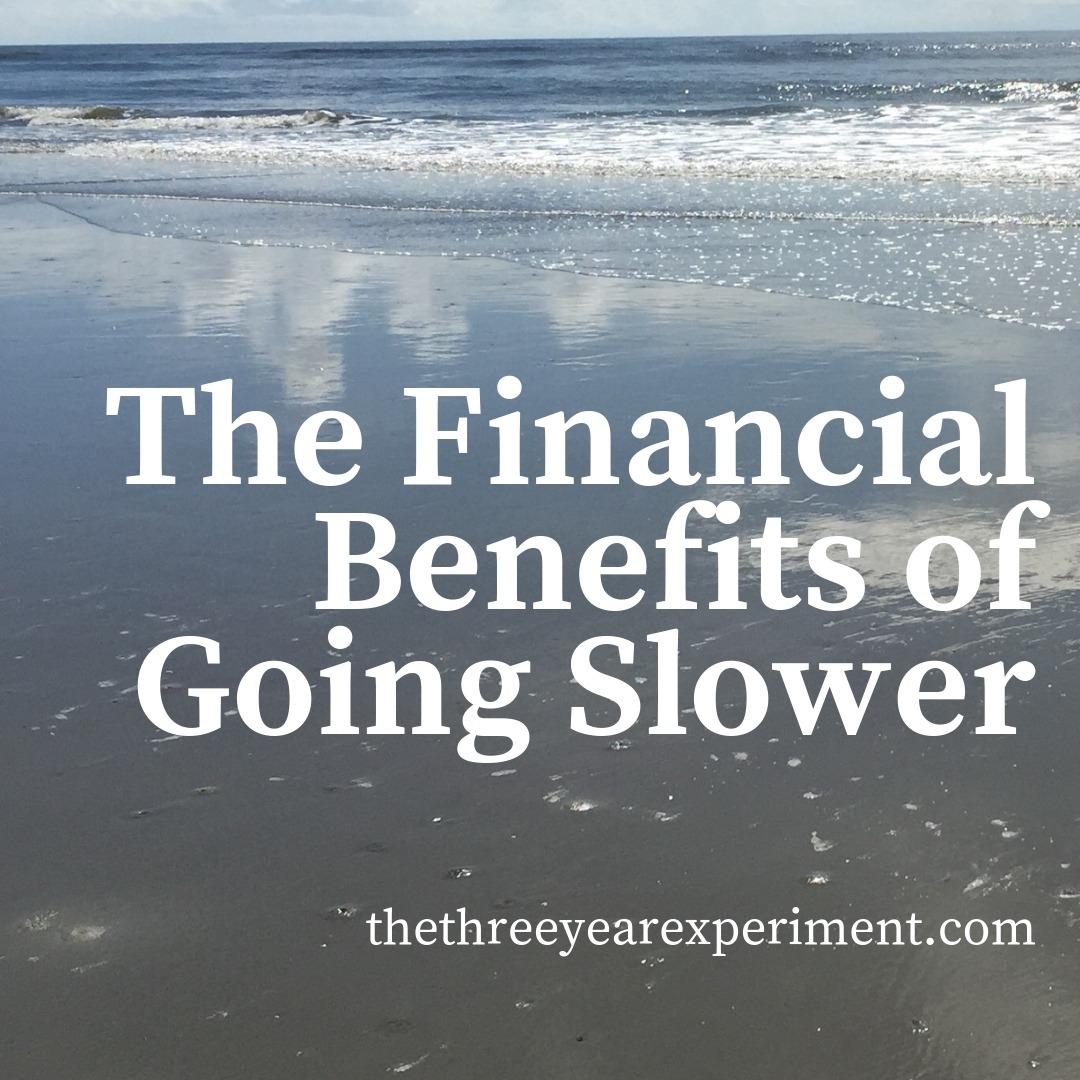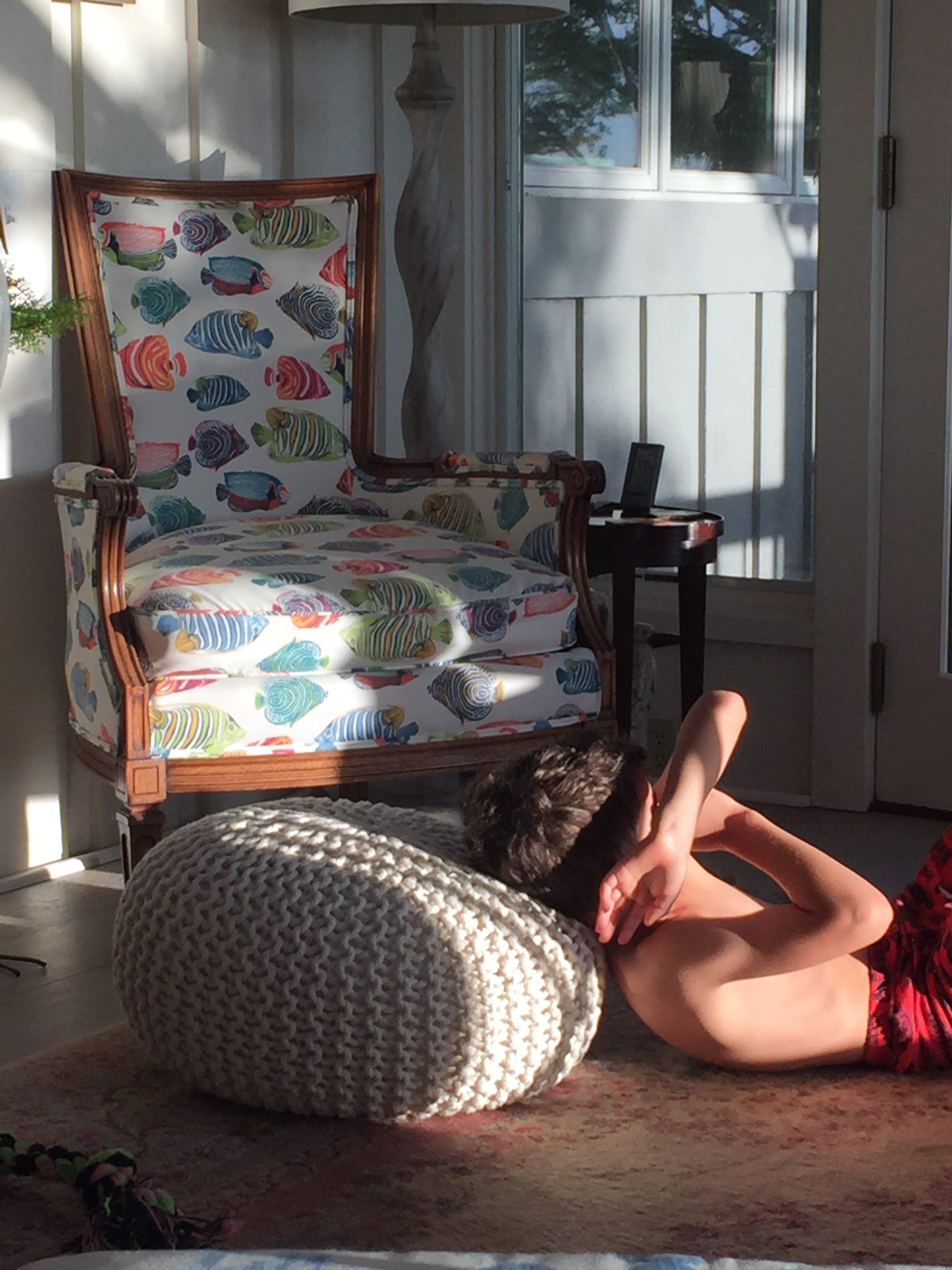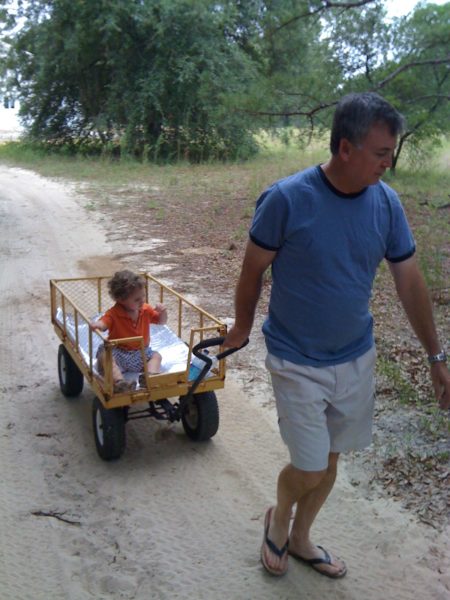This weekend we’re at the beach for three days for my cousin’s wedding (taking the boys out of school for the first time as we practice our ability to be location independent–just for a day!).
It’s amazing how nice it is to leave routine and embrace the ability to go hang out at the ocean for awhile. Lucy the Puppy is in heaven. We run her around on the leash-free part of the beach in the morning, and she sleeps for most of the afternoon. And the sun and sand has been good for all of us, giving us some time to unplug from our new school routines and enjoy nature.
This weekend has also given me a chance to reflect on how going slower impacts our financial lives.
I raced through the first part of my life at break-neck speed, as if to cram everything possible into my day so I couldn’t possibly miss anything. I sucked hard from the orange of life and had the juice running down my chin to prove it.
As the years have passed and I have become an older human being, I’ve slowed down. I don’t, frankly, have as much energy. No one is more shocked and dismayed by this than I, because who knew that stuff ran out? But the truth is, slowing down is inevitable, and because I have more limited energy, I want to spend that energy on the things that matter, not the things that don’t.
Since we’ve moved to North Carolina, I’ve been making a concerted effort to do less:
- less work
- less activities for the kids
- less “to-do” lists
The more I read about crafting the simple life, the more I realize that it requires margin: chunks of time that are deliberately left unscheduled to make room for the sweet stuff of life. This slower pace really does make everyone in my family feel better.

We currently have no after school activities, which feels really weird sometimes. But the boys are getting used to new schools and they are exhausted when they get home. They just want to rest, play with the neighbors, build forts, or read.
I’m not signing up for volunteering, new projects, or new work for awhile. Since I’m taking this year off as an ESL teacher, I’ve decided that I can be the biggest help as a support for my kids and the person that figures out all the logistics of our new home: which doctors and dentists to visit, how to get our cars registered, where to shop for groceries (that’s already been answered: Aldi. But there is a new Lidl opening up so I will check it out!). But I’ll do all those things slowly, because I’ve also realized that when I’m stressed out an frazzled, it negatively affects my family.
But are there really financial benefits to this slower life if I’m not working? Let’s take a look.
Reducing Knee-Jerk Purchases
When we’re moving through life at a break-neck speed, it sometimes feels as if we need to make all of our decisions right now. If we’re at a store, and we see that juicer that we’ve been thinking about purchasing, we’ll be more inclined to buy it because when will another chance come up? Time is precious so we should make the decision now.
When we’re taking life at a slower pace, we can give ourselves the luxury of time. “I can always come back and buy this later,” I’ve found myself thinking on more than one occasion, because I have time to do that. And nine times out of ten, I’ve decided I don’t need the item in question once I’m home.

When my head is full of work/kids/after-school activities, I reduce my mental bandwidth. We only have so much attention we can devote to any given task, and once that amount of attention is depleted, we have no more to give. If my mental bandwidth is otherwise occupied with all the activities that I’ve crammed into my schedule, then my cognitive function is reduced. My decision-making skills are weaker and I’m more likely to make knee-jerk or otherwise poor decisions.
How do super frugal people optimize every buying decision they make? I’m convinced it’s because they keep their lives relatively simple. In order to keep your grocery bill under $300 for your family of five (or whatever), you’ve got to devote a great deal of mental capacity to planning, optimizing, and staying the course of your plan day after day.
If life gets crazy, it might be easy to go home and pull out that frozen pizza on Night 1, but if you have a crazy Monday night, then Tuesday night, then Wednesday night, of activities, sports, meetings, and the like, you’re going to get mentally fatigued and by Wednesday, much more likely to succumb to the pull of the drive-through window, especially when the kids are begging for it.
Practicing Telling Yourself No
Because I’m not working, it’s more imperative that I tell myself “no” now. While it can be harder in the moment to stick with that decision, because I have more time to think about why I should tell myself “yes” or otherwise talk myself into something, having less in my life and my family’s life means I have a bit more self-control. That might sound weird, but again, it goes back to the mental bandwidth idea. Human beings can apparently only make so many decisions per day before they lose vast amounts of self-control in their decision-making.
Once you’ve exhausted your self-control, you have no more until you sleep and replenish your mental stores. So, because I have less decisions to make during the day, when I do tell myself “no,” it’s easier to stick with that decision.
More Margin in Your Life for Planning
Planning is essential for good financial decisions. We spend less and save more when we have a careful plan that includes back-up contingencies for when life inevitably goes astray.
The first thing that seems to go when life gets busy, though, is planning. If I take the time to inventory and meal plan at the beginning of the week, we’re less likely to waste food, less likely to eat out, and more likely to eat delicious meals every night. And yet, if I have too much going on, I’m more likely to swing by the grocery store on the way back from a meeting and “wing it” which insures I will spend more and not buy the items we really need.
Time for planning allows us to create short-term weekly plans for the grocery store, but also monthly and yearly plans. When I have time to plan, I can figure out how we can structure our money to pay off our cars and our apartment in Chile. We can come up with a plan to double our net worth in three years and figure out when we can reasonably expect to retire. We can make college funding decisions and figure out exactly what we need to save over the next seven and ten years for our boys.
Planning takes a different sort of time. It takes unstructured thinking or daydreaming time for your mind to figure out ways to solve the hypotheticals you pose. And that time can’t really be structured. “This afternoon, I’m going to figure out how we’re going to fund the boys’ college,” I might think. But sometimes my brain has to wander in order to come up with the out-of-the-box thinking that we need.
That time happens during runs, when I’m writing in my journal, when Mr. ThreeYear and I are having a leisurely after-dinner conversation or lunchtime bike ride, or when we’re just staring off into space. The more unstructured thinking time we give ourselves (or, I should say, the more do-nothing time we give ourselves where that unstructured thinking happens) the better conclusions we can come up with for our short- and long-term financial plans.

That means that I also have to be very careful not to try and fill that do-nothing time with something. It’s very easy to pull out my phone and scroll Instagram when I’ve got “nothing else to do.” In fact, last week I deleted my email app from my phone and put all my remaining apps in three small folders on Page 2 of my iPhone screen so as to remove as much temptation as possible. After all, if I’m creating a simpler life, I have to truly create a simpler life where I can be more present.
More Thoughtful Decisions
Again, when I have more time to mull decisions over, I can be more thoughtful. For example, a friend recently had a baby. My friends and I wanted to throw her a shower, but she didn’t want that. She wanted a practical gift instead. Having more time meant better communication with my friend, where I took the time to really understand what she wanted, instead of pushing for a shower that would have meant extra time, money, and stress, when she didn’t really want that (but wouldn’t have outright told me).
Having more margin gives me space to better listen, to take a step back, think about the information I’ve been given, and reflect. Because I have traditionally taken life at breakneck speed, I tend to act first, think/reflect later. This is especially true when it comes to decisions like the baby shower one. I have been described as “bulldozing” people. It’s not out of ill-will or wanting to get my way (usually!). It’s more being blind to people’s hidden cues or more subtle communications because I’m going too fast and not taking the time to reflect on their whole message.
I like to get a decision made, then move on. But having more time and more margin means that I’m making decisions in a slower way, which turns out to be a very good thing.
I’m working to keep things simple and add new activities in very carefully. I hope that this will help our financial position this year but I’ll keep you posted!



That’s a great term — leaving margin! I’m all for anything that helps move us away from functioning in the reactive, knee-jerk state.
I think sometimes I move too fast (yes, bulldoze) — not because I have so much to do–but because I’m in a race to “done”. Done means I can relax. But if I take a more relaxing pace, then I don’t need to rush to done. I hope that makes sense.
Thanks–I agree, “margin” somehow helps me conceptualize that I need room/time/space in my life to let unplanned things happen.
You make a good point–racing through your to-do list means then you don’t have to work anymore. I feel like my to-do list is never over since we’ve moved. Every where I turn there’s something else I “should” do (“I really need to organize that linen closet,” “I should find a place to put the china,” “We need to find shoe racks for this closet”). How long have you been living in your house? Good luck in this storm, by the way. We’ve got our batteries and flashlights ready and water ready. It’ll be interesting to see how it plays out.